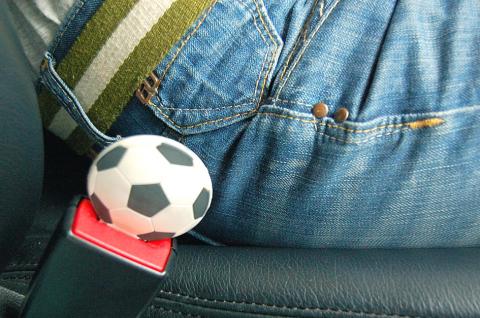The “child safety seat” and “silent buckle” — used to quieten car seatbelt alarms — are popular products. Manufacturers even boast of such products having passed national standard inspections.
The only problem? While the products may not be illegal per se, using them certainly is.
According to the Road Traffic Security Rules (道路交通安全規則), bicycles are barred from carrying passengers, and violators could face a fine of between NT$300 and NT$600, an official with the Ministry of Transportation and Communications’ Department of Railways and Highways said. However, in practice the police do not ticket violators and the public flouts the rules.

Photo: Tseng Hung-ju, Taipei Times
The legal authorities are at an even greater loss when it comes to disciplining the manufacturers of such unsafe products. They have their hands tied because of a lack of relevant regulations.
In the meantime, large numbers of parents continue to take their children to school or on outings in the safety seat, and are no doubt reassured that the seat has cleared a quality inspection.
Meanwhile, demand is rising for the “silent buckle,” retailers said.
In August last year the ministry made it compulsory for backseat passengers to buckle up, in a bid to reduce the death toll from road accidents.
A decade ago, the ministry made it compulsory for front-seat passengers to wear seat belts, and then decreed that automobile manufacturers must equip cars with a seat-belt reminder light or some kind of warning alarm, activated by a pressure sensor under the passenger seat, to persuade people to belt up.
However, by plugging in the silent buckle the seatbelt alarm is disabled and the annoying alarm tone, that would otherwise force passengers into buckling up, goes silent. Priced between NT$100 and NT$200, a driver can purchase a dozen of the devices for less than the price of a traffic ticket.
With the latest legislation requiring back-seat passengers to buckle up, sales volumes have increased by at least 30 percent, auto parts retailers said, adding that they have been busy replenishing their stocks to meet the growing demand.
Lin Fu-shan (林福山), head of the ministry’s Department of Railways and Highways’ supervision section, said the two products are in clear violation of the regulations, but there is no law to penalize producers of the illegal products.
Lin said that installing child safety seats on bikes is against regulations, but is mostly considered a trivial offense and is not reported. Violators usually only receive a warning instead of being fined, he said.
Translated by Stacy Hsu, Staff Writer

‘DENIAL DEFENSE’: The US would increase its military presence with uncrewed ships, and submarines, while boosting defense in the Indo-Pacific, a Pete Hegseth memo said The US is reorienting its military strategy to focus primarily on deterring a potential Chinese invasion of Taiwan, a memo signed by US Secretary of Defense Pete Hegseth showed. The memo also called on Taiwan to increase its defense spending. The document, known as the “Interim National Defense Strategic Guidance,” was distributed this month and detailed the national defense plans of US President Donald Trump’s administration, an article in the Washington Post said on Saturday. It outlines how the US can prepare for a potential war with China and defend itself from threats in the “near abroad,” including Greenland and the Panama

A magnitude 4.9 earthquake struck off Tainan at 11:47am today, the Central Weather Administration (CWA) said. The hypocenter was 32.3km northeast of Tainan City Hall at a depth of 7.3km, CWA data showed. The intensity of the quake, which gauges the actual effect of a seismic event, measured 4 in Tainan and Chiayi County on Taiwan's seven-tier intensity scale, the data showed. The quake had an intensity of 3 in Chiayi City and County, and Yunlin County, while it was measured as 2 in Kaohsiung, Nantou County, Changhua County, Taitung County and offshore Penghu County, the data showed. There were no immediate reports of

The Chinese Nationalist Party (KMT) is maintaining close ties with Beijing, the Democratic Progressive Party (DPP) said yesterday, hours after a new round of Chinese military drills in the Taiwan Strait began. Political parties in a democracy have a responsibility to be loyal to the nation and defend its sovereignty, DPP spokesman Justin Wu (吳崢) told a news conference in Taipei. His comments came hours after Beijing announced via Chinese state media that the Chinese People’s Liberation Army’s Eastern Theater Command was holding large-scale drills simulating a multi-pronged attack on Taiwan. Contrary to the KMT’s claims that it is staunchly anti-communist, KMT Deputy

RESPONSE: The government would investigate incidents of Taiwanese entertainers in China promoting CCP propaganda online in contravention of the law, the source said Taiwanese entertainers living in China who are found to have contravened cross-strait regulations or collaborated with the Chinese Communist Party (CCP) could be subject to fines, a source said on Sunday. Several Taiwanese entertainers have posted on the social media platform Sina Weibo saying that Taiwan “must be returned” to China, and sharing news articles from Chinese state media. In response, the Mainland Affairs Council (MAC) has asked the Ministry of Culture to investigate whether the entertainers had contravened any laws, and asked for them to be questioned upon their return to Taiwan, an official familiar with the matter said. To curb repeated